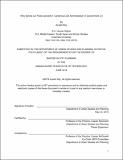Who serves our public servants? : centering core administration in government 2.0
Author(s)
Roy, Ayushi.
Download1140076103-MIT.pdf (488.5Kb)
Alternative title
Centering core administration in government 2.0
Other Contributors
Massachusetts Institute of Technology. Department of Urban Studies and Planning.
Advisor
Ceasar McDowell.
Terms of use
Metadata
Show full item recordAbstract
Currently, most literature sees 'civic technology' and the digital service units that build them as an answer to the challenge of modernizing governance and delivering social services. My hypothesis is that, contrary to existing literature, greater digitization alone of government services does not strengthen government performance. The reason for this gap between digitization and modernization can be attributed to a variety of conditions -- institutional culture, procurement practices, and unresponsive budgeting, among others. But I argue that the underlying problem is rooted in how digital service units have yet to view their own public employees as in need of service. In the move towards making governance more "user-centered," public interest technologists have forgotten one of government's biggest users: those on the inside. One of the biggest services government provides is a public salary and access to income stability for minorities and women. In addition, improving service delivery requires improving the experience for the person serving. How can we shape a future of digital governance that does not pit our external users against our internal users, particularly when both are seeking the same access to stability and dignity? By recognizing the human qualities of digital transformation, this thesis advocates for digital governance that better engages the administrators, public workers, and 'middle management' who remain core to government operations beneath the veil of digital transformation.
Description
This electronic version was submitted by the student author. The certified thesis is available in the Institute Archives and Special Collections. Thesis: M.C.P., Massachusetts Institute of Technology, Department of Urban Studies and Planning, 2019 Cataloged from student-submitted PDF version of thesis. Includes bibliographical references (pages 54-56).
Date issued
2019Department
Massachusetts Institute of Technology. Department of Urban Studies and PlanningPublisher
Massachusetts Institute of Technology
Keywords
Urban Studies and Planning.